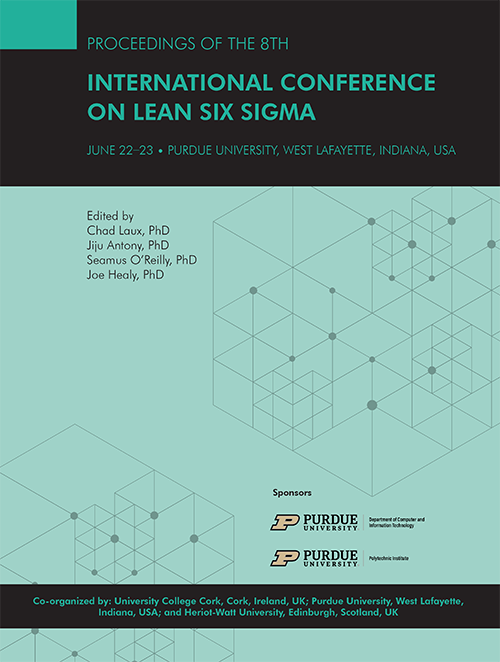Abstract
Abstract
Purpose- Six Sigma is based upon quality improvement by finding the root cause and refining processes to the precision of process outcomes. The purpose of this research was to conduct a systematic literature review (SLR) to explore the Six Sigma techniques and information technology (IT) management concepts to identify the IT management principle's impact on the sustainability of Six Sigma project efforts and identify the gaps that are essential to be addressed through further research. This research also discusses the principles of IT management upon the influence on Six Sigma projects, and subsequent contribution to organizational economic sustainability. An effective IT infrastructure including communication, data warehousing, and software maximizes the organization’s knowledge for management and allowing products and services to be delivered with enhanced quality. Thus, in the absence of that cooperation, Six Sigma projects may be unsustainable.
Design/methodology/approach- Literature published on Six Sigma, sustainability, and related IT management was investigated. The peer-reviewed journal articles were retrieved from different management science publishers, including Emerald, Elsevier, Science Direct, and Springer Link by using the search terms: Six Sigma, sustainability, and related IT management and their combinations. A content analysis was also adopted to analyze the relationship of IT management principles, Six Sigma applications, and sustainability in small-medium organizations.
Findings- Two major themes were developed from the data analysis and coding process. First: effects of Six Sigma on organizational sustainability. Second: effects of IT principles on organizational sustainability.
Keywords- Six Sigma, Sustainability, IT Management, IT Infrastructure, Organizational Sustainability
DOI
10.5703/1288284317329
Recommended Citation
Alduraibi, Manal; Winders, Timothy; and Laux, Chad, "Six Sigma, Sustainability, and IT Management: A Research Review and Discussion of Future Directions" (2021). International Conference on Lean Six Sigma. 1.
https://docs.lib.purdue.edu/iclss/2021/trends/1
Included in
Business Administration, Management, and Operations Commons, Business and Corporate Communications Commons, Computer and Systems Architecture Commons, Industrial Engineering Commons, Industrial Technology Commons, Management Information Systems Commons, Organization Development Commons, Other Operations Research, Systems Engineering and Industrial Engineering Commons
Six Sigma, Sustainability, and IT Management: A Research Review and Discussion of Future Directions
Abstract
Purpose- Six Sigma is based upon quality improvement by finding the root cause and refining processes to the precision of process outcomes. The purpose of this research was to conduct a systematic literature review (SLR) to explore the Six Sigma techniques and information technology (IT) management concepts to identify the IT management principle's impact on the sustainability of Six Sigma project efforts and identify the gaps that are essential to be addressed through further research. This research also discusses the principles of IT management upon the influence on Six Sigma projects, and subsequent contribution to organizational economic sustainability. An effective IT infrastructure including communication, data warehousing, and software maximizes the organization’s knowledge for management and allowing products and services to be delivered with enhanced quality. Thus, in the absence of that cooperation, Six Sigma projects may be unsustainable.
Design/methodology/approach- Literature published on Six Sigma, sustainability, and related IT management was investigated. The peer-reviewed journal articles were retrieved from different management science publishers, including Emerald, Elsevier, Science Direct, and Springer Link by using the search terms: Six Sigma, sustainability, and related IT management and their combinations. A content analysis was also adopted to analyze the relationship of IT management principles, Six Sigma applications, and sustainability in small-medium organizations.
Findings- Two major themes were developed from the data analysis and coding process. First: effects of Six Sigma on organizational sustainability. Second: effects of IT principles on organizational sustainability.
Keywords- Six Sigma, Sustainability, IT Management, IT Infrastructure, Organizational Sustainability






